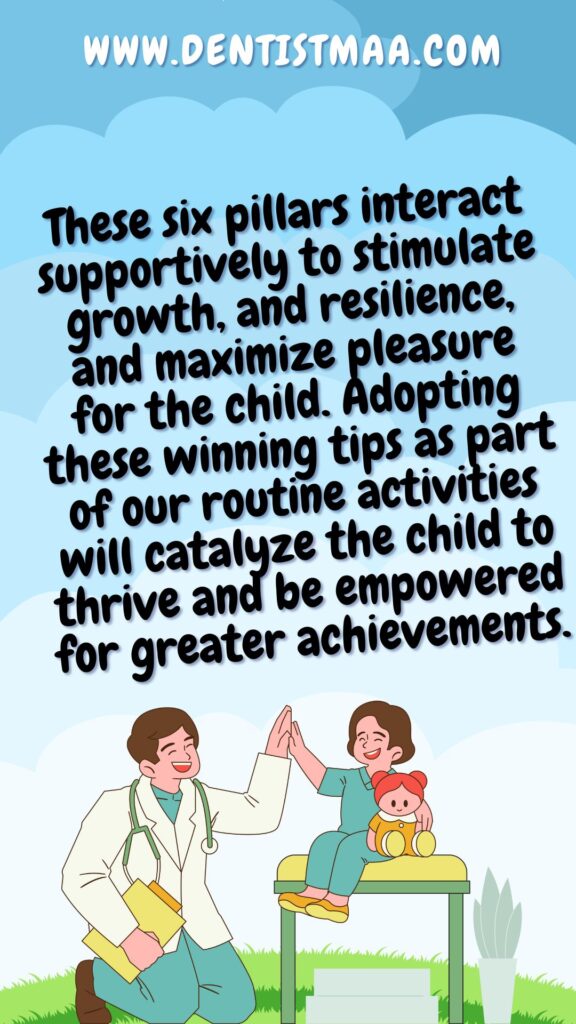A child’s health and happiness is the key to raising a child well. And with the world mainly dominated by stress, conflicts, and migration from the principles of humanity, which is non-existent in today’s hectic lifestyles, the job becomes more difficult. Due to work, hobbies, appointment scheduling, and commitment, life is usually filled with these activities, sometimes preventing us from the simple things that can make our kids lead healthier and more satisfied lives.
As parents, we all strive to provide the best for our children, ensuring they grow up healthy, happy, and well-adjusted. Balancing the demands of modern life with the needs of our kids can be challenging, but with some mindful practices, we can significantly enhance their well-being.
However, concentrating on various fundamental factors, such as nutrition, physical activity, and mental health, can be indispensable for your child’s success in later life. We will examine how shaping good eating habits, regular exercise, and mental health are a few of the issues that must be addressed. Furthermore, the six strategies we have proposed are quick to implement. You and your family can seamlessly add them to your daily routine.
1. Nutrition: The Foundation of a Healthy Childhood
Diet is important in children’s lives as well and serves as the cornerstone of a healthy and happy life. An inspiring diet of fruits, vegetables, whole grains, and lean protein provides the much-needed nutrition necessary for growth, development, and overall well-being.
Encouraging children to eat various nutritious meals and reduce the consumption of sugary drinks and snacks lays the groundwork for good habituated health that may persevere for a lifetime. Through their diets, parents and caregivers may help promote children’s general well-being and enable it to occur as soon as possible in their lives.
A nutritious diet is fundamental for your child’s growth, development, and overall well-being. Ensure their meals include a variety of fruits, vegetables, whole grains, and lean proteins. Limiting sugary snacks and beverages can also prevent health issues like obesity and diabetes.
- Involve Your Kids: Let your children participate in meal planning and preparation. This makes them more interested in healthy eating and teaches them valuable life skills.
- Colourful Plates: Aim for a colourful plate at each meal. Different colours often represent different nutrients, ensuring a well-rounded diet.
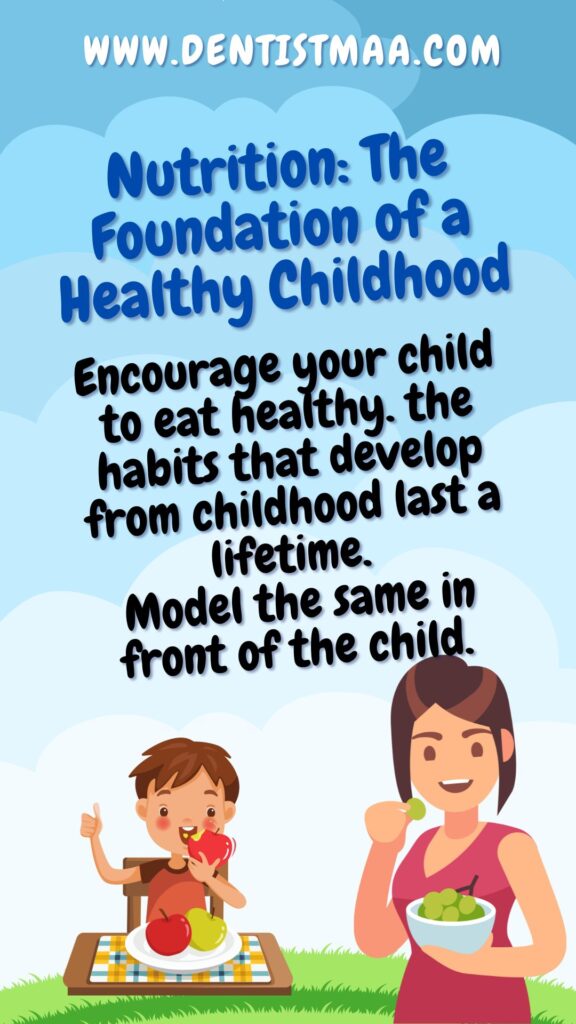
2. Physical Activity: Keeping the Body and Mind Active
Children’s health and well-being must regularly exercise to ensure their bodies and minds are active. Regular exercise improves physical fitness, increases mood levels, reduces anxiety, and improves the brain’s capacity for children. Encourage your child to engage in sports, active play, and whatever leisure activities they like. Make a game out of physical activity, or do something challenging or fascinating, like hiking.
Physical activity is crucial for maintaining a healthy weight, building strong bones and muscles, and promoting mental well-being. Children should get at least an hour of moderate to vigorous physical activity every day.
- Make it Fun: Find activities your child enjoys, whether it’s swimming, biking, dancing, or playing sports. The key is to keep it enjoyable so they look forward to being active.
- Family Time: Incorporate physical activities into family time. Go for walks, play in the park, or have a dance party at home.
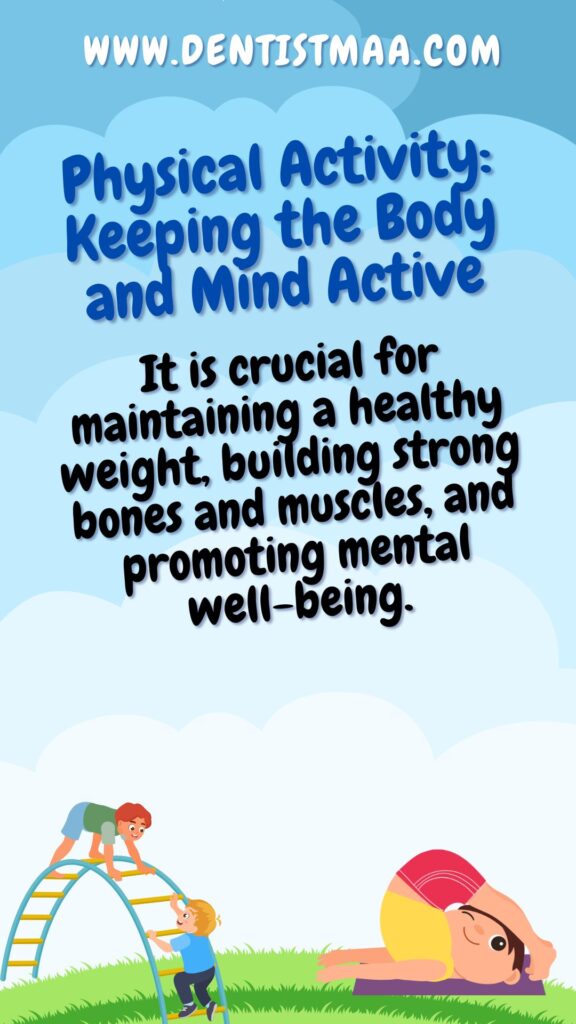
3. Mental Health: Fostering Emotional Well-being
Mental health is one of the things to take care of for your child in the fast-paced world. Observe any changes or indications of distress in your child’s behaviour and pay attention to their emotional well-being. Create a nurturing and open environment where your children can share their thoughts and feelings without fear. Healthy relaxation techniques such as meditation, deep breathing, and music-making endeavours can also be used.
Emotional health is as important as physical health. Children who feel loved, supported, and understood are more likely to develop into confident and resilient adults.
- Open Communication: Encourage your children to express their feelings and listen to them without judgment. Validate their emotions and help them navigate their experiences.
- Quality Time: Spend quality time with your kids, engaging in activities they enjoy. This strengthens your bond and provides them with a sense of security and belonging.
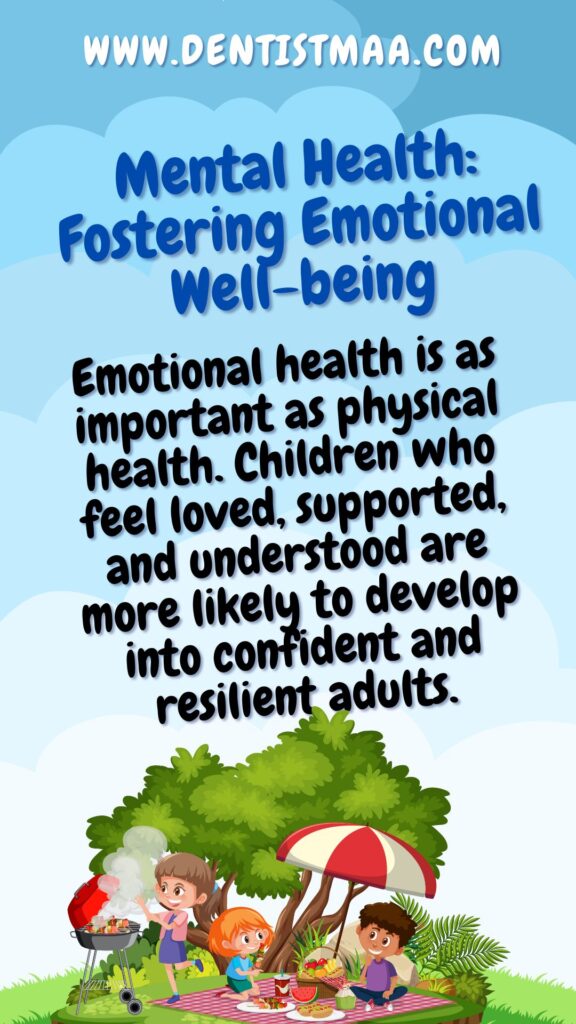
4. Learning and Creativity: Nurturing their minds
Encouraging a love for learning and creativity can significantly impact your child’s happiness and intellectual growth. Provide opportunities for them to explore their interests and develop new skills. Help them and boost them in whatever new they want to try. This will create a stronger bond with them and keep them happy.
- Stimulating Environment: Create a stimulating environment at home with access to books, art supplies, and educational games.
- Praise Effort, Not Just Results: Encourage effort and perseverance rather than just praising achievements. This fosters a growth mindset and a love for learning.

5. Quality Sleep: Ensuring Restorative Nights
Adequate sleep is very important for your child’s development of healthy physical and mental conditions. Children should sleep in a peaceful, diversion environment and stick to a set bedtime routine. Children should get enough sleep based on age to receive the necessary rest each night. Resting promotes your child’s growth, learning ability, and emotional regulation, which allows them to have a great day. It helps improve attention, behaviour, learning, and overall mental and physical health. The American Academy of Sleep Medicine recommends 9-12 hours of sleep for children aged 6-12 and 8-10 hours for teenagers.

- Calming Bedtime Routine: Establish a calming bedtime routine that might include reading a book, taking a warm bath, or listening to soft music.
- Consistent Schedule: Maintain a consistent sleep schedule even on weekends. This helps regulate their internal clock and makes falling asleep easier.
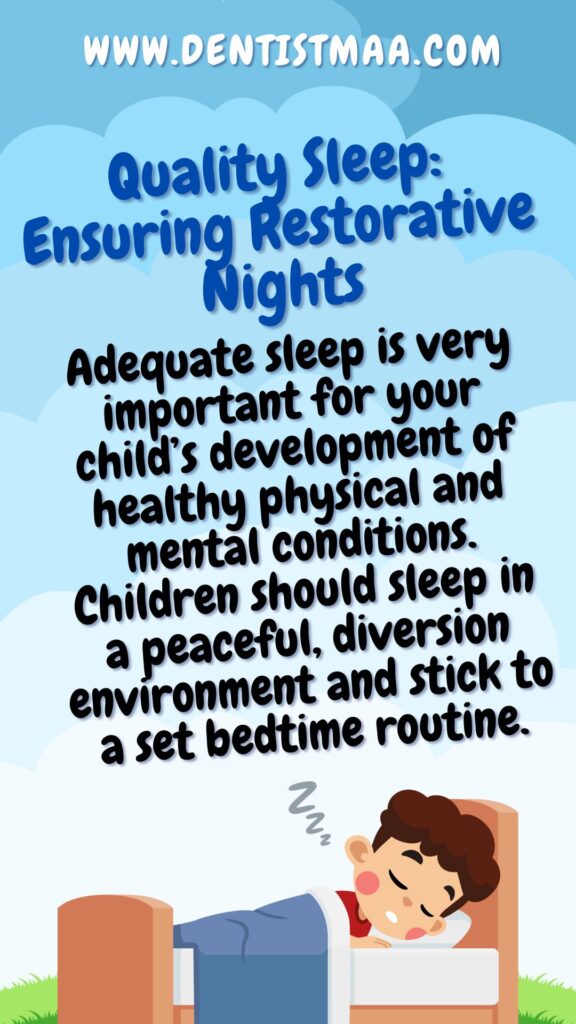
6. Family Time and Social Connections: Strengthening Bonds
Spending time with family is an irreplaceable source of family bonding and happiness. Spend quality time engaging in various activities, such as having meals together, playing games, going on walks, or having conversations, to connect with relatives on a deeper level and contribute to building strong unity.
Every minute shared adds to the thread of love and empathy. Engage in activities that encourage laughter, communication, and togetherness. Have fun outside, or watch movies at home, whether making memories or having a good time, every moment together adds to love and unity. Sharing time creates happiness and promotes unity and support among family members. It could be an unplanned trip or a get-together, and it is a great way to spend more time with family.
Strong social connections are vital for a child’s emotional health. Friendships help children develop important social skills, such as empathy, cooperation, and problem-solving.
- Encourage Social Activities: Encourage your child to participate in group activities, such as sports teams, clubs, or community events.
- Model Positive Relationships: Show your child how to build and maintain healthy relationships by modelling positive interactions with others.

Conclusion
In conclusion, ensuring the health of our children requires an all-encompassing approach that addresses all areas related to their health and happiness. Proper nutrition, physical activity, mental wellness, the use of supplements whenever necessary, adequate sleep, and meaningfully spent time with family are pillars for a child’s overall well-being.
These six pillars interact supportively to stimulate growth, and resilience, and maximize pleasure for the child. Adopting these winning tips as part of our routine activities will catalyze the child to thrive and be empowered for greater achievements.
Share your thoughts and experiences! What tips have worked for your family? Let’s create a community of support and inspiration for all parents.
